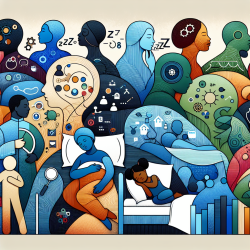Introduction
In the realm of speech-language pathology, understanding the nuances of sleep health is crucial, especially when considering its impact on child development and learning outcomes. The recent research paper, #NoJusticeNoSleep: Critical intersections of race-ethnicity, income, education, and social determinants in sleep health disparities, offers a comprehensive look into how these factors intersect to affect sleep health, particularly among racial-ethnic minority groups in the United States.
Key Insights from the Research
The research highlights several critical points:
- Racial-Ethnic Disparities: Individuals from racial-ethnic minority groups often experience inadequate sleep duration and less restful sleep.
- Socioeconomic Factors: Lower income and education levels are linked to poor sleep quality, which can lead to adverse physical and mental health outcomes.
- Social Determinants: Factors such as neighborhood disadvantage, crime, and racial discrimination contribute significantly to sleep health disparities.
Implications for Practitioners
As practitioners, integrating these findings into your practice can enhance your ability to support children and families from diverse backgrounds:
- Holistic Assessments: Consider incorporating questions about sleep patterns and social determinants into your assessments to better understand the child's environment and its impact on their health.
- Community Engagement: Work with community organizations to address social determinants that may affect sleep health, such as housing and neighborhood safety.
- Advocacy: Use data to advocate for policies that address systemic inequalities affecting sleep health, such as equitable access to healthcare and education.
Encouraging Further Research
The research calls for a shift from using race-ethnicity as a predictor of sleep health disparities to understanding the multifaceted racialized experiences that contribute to these disparities. Practitioners can contribute by:
- Participating in Studies: Engage in or support research that explores the unique barriers and facilitators of sleep health among different racial-ethnic groups.
- Collaborating Across Disciplines: Work with researchers from various fields to develop comprehensive interventions that address sleep health disparities.
Conclusion
Addressing sleep health disparities is not only a matter of improving individual health outcomes but also a step towards achieving social justice. By understanding and acting upon the social determinants of sleep health, practitioners can play a pivotal role in creating equitable health outcomes for all children.
To read the original research paper, please follow this link: #NoJusticeNoSleep: Critical intersections of race-ethnicity, income, education, and social determinants in sleep health disparities.










